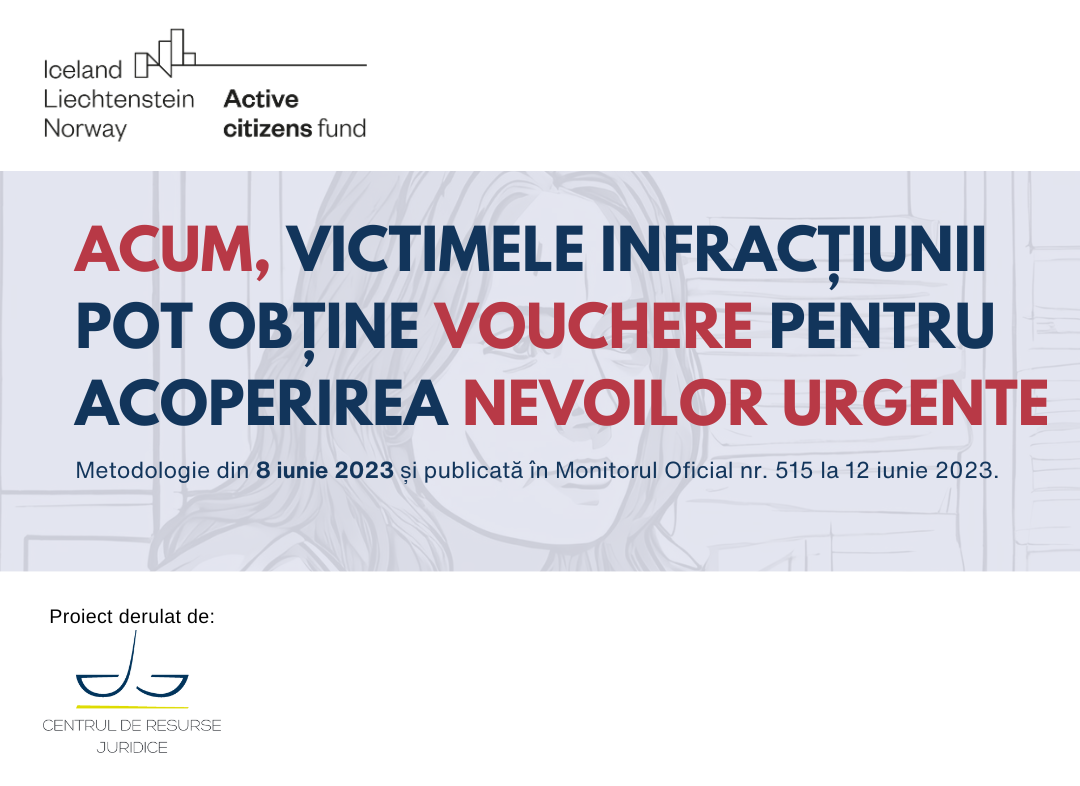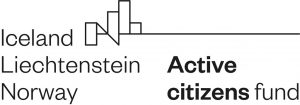The Methodology for the issuance, distribution and settlement of vouchers for victims of crime, for determining their amount, as well as the selection criteria for public and private entities enrolled in the mechanism, was adopted on 8 June 2023 and published in the Official Gazette No. 515 on 12 June 2023.
This methodology is in addition to the Law No. 211/2004 on measures to ensure information, support and protection of victims of crime, as subsequently amended and supplemented, which provides in Chap. V “The granting by the State of financial compensation to victims of crime”. Before discussing the methodology, it is necessary to indicate in addition to which provisions it was adopted.
Some aspects of financial compensation under Law 211/2004
Financial compensation is granted only upon request to the following categories of victims, according to Art. 21 para. (1):
(a) persons subjected to a crime amounting to attempted murder and aggravated murder, as referred to in Articles 188 and 189 of the Criminal Code, a crime of bodily harm, as referred to in Article 194 of the Criminal Code, an intentional crime resulting in bodily harm to the victim, a crime of rape, sexual intercourse with a minor and sexual assault, as referred to in Articles 218-220 of the Criminal Code, a crime of human trafficking persons and trafficking in minors, as referred to in Articles 210 and 211 of the Criminal Code, a crime of terrorism, and any other intentional crime committed by violence;
b) the spouse, children and dependants of persons who have died as a result of crimes referred to in paragraph 1. (1).
Art. 27 para. (1) shall specify the categories of damages suffered by the victim as a result of the crime. Thus:
(a) in the case of victims referred to in Article 21 para. (1) (a):
1. hospital and other medical expenses incurred by the victim;
2. material damage resulting from the destruction, deterioration or rendering useless of the victim’s property or from the dispossession of the victim through the carrying out of the crime;
3. any gain the victim is deprived of as a result of the crime;
(b) in the case of victims referred to in Article 21(2), the following (1) (b):
1. funeral expenses;
2. maintenance which the victim is deprived of as a result of the crime.
Article 30 provides for the possibility of the victim to claim a part of the financial compensation to be paid in advance, a part up to an amount equivalent to 10 gross national minimum basic salaries established for the year in which the victim claimed the compensation in advance. The part of the compensation that is paid in advance is granted if the victim is in a precarious financial situation, and the victim’s request for a payment in advance of the financial compensation is settled within 30 days of the date of the request.
What is new in the Methodology of 8 June 2023?
The methodology adopted this year develops a compensation mechanism and sets out the steps, responsibilities and documents related to the process of issuing, distributing and settling vouchers given to victims of crime. Providing vouchers to victims of crime to cover urgent needs amounts to that part of the payment of the financial compensation approved by the Commission made in advance, according to Article 30 of Law 211/2004. This advance will be granted up to an amount equivalent to 5 gross minimum basic salaries per country and within a maximum of 72 hours from the approval of the request.
By urgent need we mean the demand for products or services of food, accommodation, transport, medicines and sanitary products, as well as hygiene and personal use products, expressed explicitly or implicitly by the victim of the crime, the non-fulfilment of which may harm their immediate interests.
The victim may submit an application for financial compensation or an application for an advance of the financial compensation in the form of a voucher to cover urgent needs to the tribunal in whose jurisdiction the victim is domiciled and it shall be decided upon by two judges of the Commission for granting financial compensation to victims of crime, constituted in each tribunal.
The victim will submit to the Commission the application for the voucher and the report estimating the expenses for covering urgent needs. According to the methodology, public and private entities may provide support and assistance to victims of crime by completing the report of estimated expenses to cover needs and, where appropriate, by assisting the victim before the Commission.
The vouchers are distributed to victims through the competent public institutions and authorities, as well as associations and foundations working in the field of victim assistance and protection and social assistance. More specifically, the following public entities and authorities are authorised to distribute vouchers: the general directorates for social assistance and child protection; the National Agency against Trafficking in Human Beings, within the Ministry of the Interior; the National Agency for Equal Opportunities for Women and Men; any other public entity whose activity, according to the law or its constitutive act, is assistance and protection of victims and/or social assistance; any other state institution which, in the exercise of its duties, comes into contact with persons who are potential victims of crime.
The list of public and private entities selected and involved in the procedure for distributing vouchers to victims of crime is published and updated annually on the website of the Ministry of Justice.
Simplified step-by-step process (found as Annex 31 to the methodology)
- The victim submits to the Commission the application for the voucher and the report estimating the expenses to cover the urgent needs of crime victims.
- The Commission accepts the voucher application and determines the amount.
- The decision shall be communicated to: the victim; the National Agency for the Administration of Seized Property.
- The public or private entity shall carry out the Commission’s order by sending to the issuing unit the request to personalise the voucher with the victim’s identification data and to top up the voucher with the amount set by the Commission.
- The public or private entity shall hand over the voucher to the victim, on the basis of a report.
- The public or private entity shall notify the Ministry of Justice of the handing over of the voucher through a report.
In the Annexes to the methodology you can find the following: Annex 1 – Model Application for voucher to cover urgent needs; Annex 2 – Model Expenditure estimation report to cover urgent needs of crime victims; Annex 31 – Scheme for obtaining vouchers by crime victims; Annex 4 – Public entity enrolment form; Annex 5 – Application for association or foundation enrolment; Annex 6 – Scoring grid for the evaluation of applications from associations and foundations applying for enrolment in the mechanism for the distribution of vouchers to meet the urgent needs of crime victims; Annex 7 – Minimum elements of the list of public and private entities enrolled in the mechanism for the distribution of vouchers.
Thus, the introduction of this compensation mechanism, in the form of vouchers, is intended to help simplify the coverage of victims’ urgent needs. However, at first sight, this procedure is rather complicated and difficult. We believe that it is necessary to evaluate the effectiveness of the methodology next year, with concrete results, in order to identify whether changes to the methodology are necessary for the effective provision of support to victims of crime.
Sources:
Law nr. 211/2004 is available here: https://legislatie.just.ro/Public/DetaliiDocumentAfis/212466
The methodology of 8 June 2023 is available here: https://legislatie.just.ro/Public/DetaliiDocument/271157
Resources:
www.crj.ro/antidiscriminare/victoriia/



